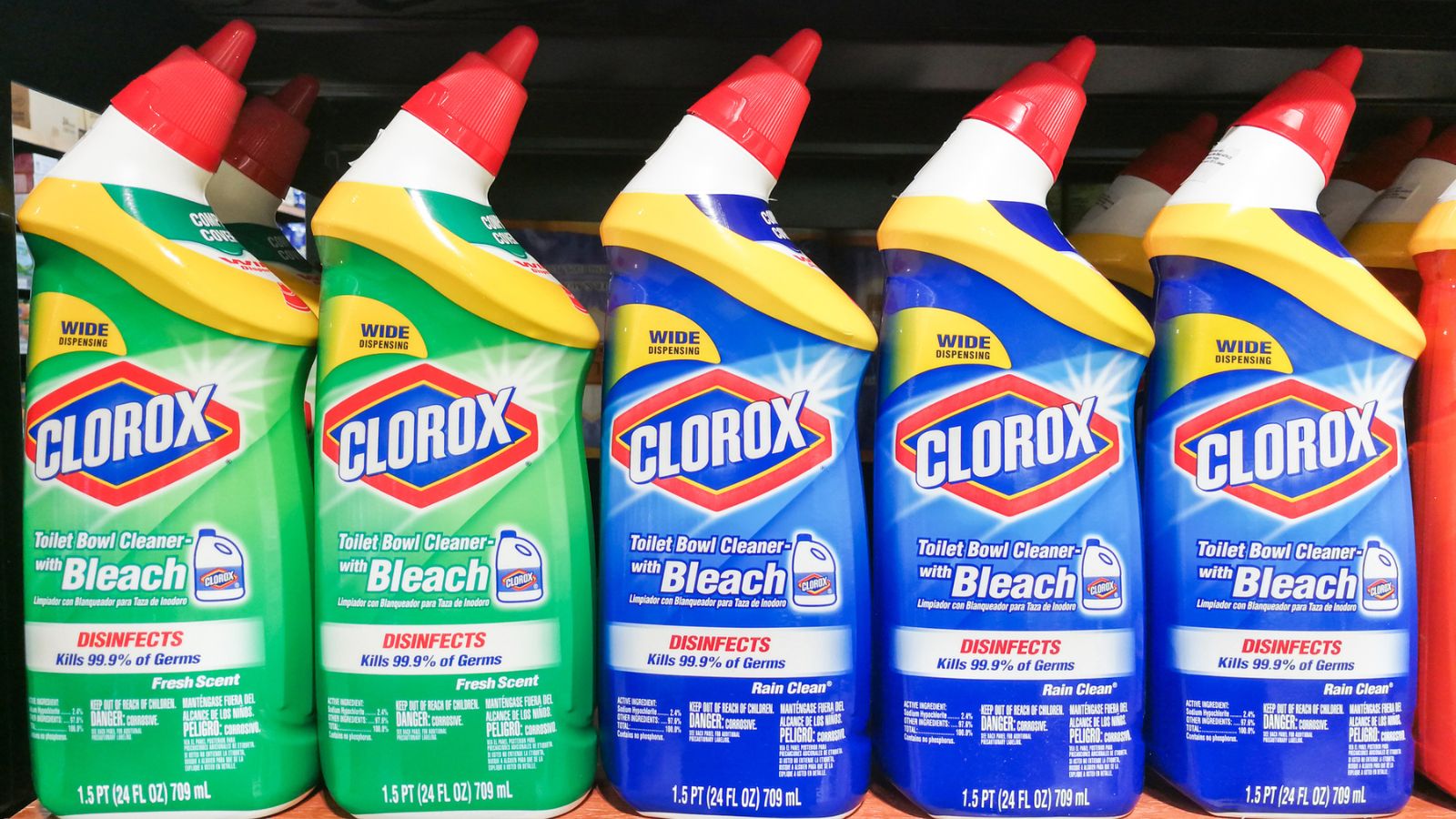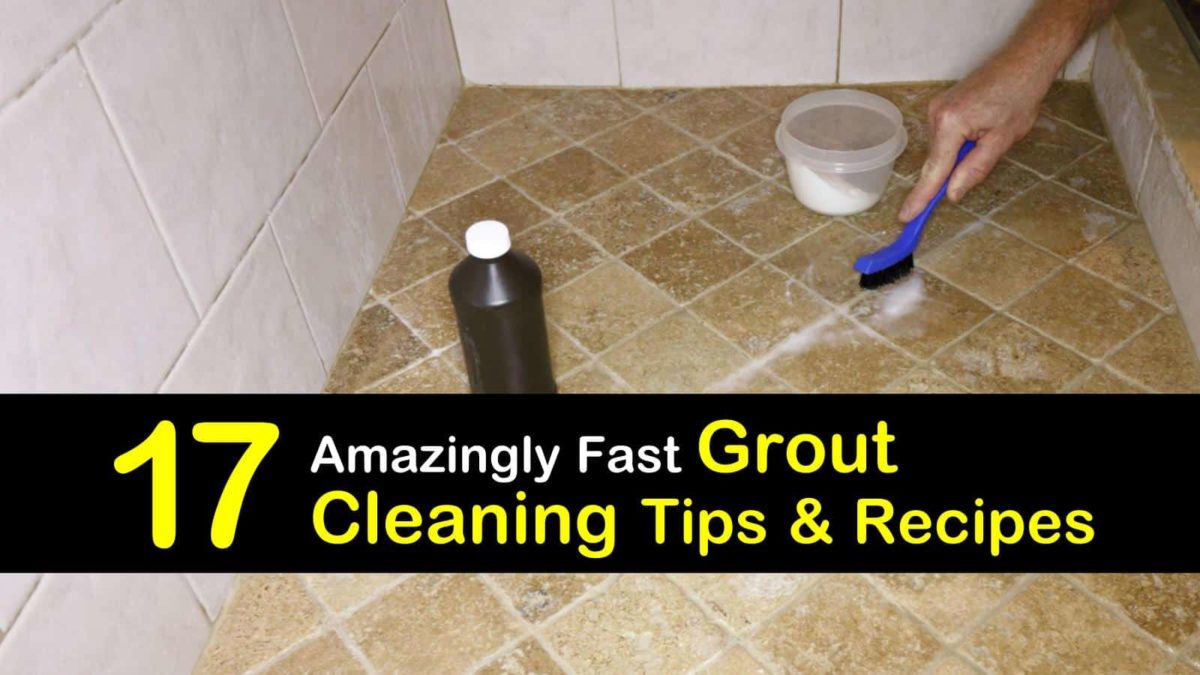Have you ever stared down at your bathroom floor, the gleaming tiles a stark contrast to the dingy lines of grimy grout? It’s a familiar sight – the inevitable result of everyday spills and grime building up. While commercial grout cleaners exist, many homeowners are drawn to the idea of tackling the task with a product already in their cleaning arsenal: toilet bowl cleaner.

Image: thethriftyapartment.com
The idea of using toilet bowl cleaner on grout may seem unconventional, but it’s certainly a common hack. This powerful cleaner, designed to tackle tough stains and mineral deposits, boasts potent chemicals like hydrochloric acid. While effective at tackling stubborn stains, it raises important questions about its safety and efficacy for grout cleaning. This article delves into the complexities of using toilet bowl cleaner on your grout, exploring the potential benefits and risks, and providing you with a more informed approach to tackling those stubborn grout lines.
The Appeal of Toilet Bowl Cleaning for Grout
So why would one consider toilet bowl cleaner for grout? The answer lies in its potent cleaning prowess. It’s formulated to tackle the toughest stains, including mineral deposits, hard water build-up, and rust—issues that are often present in grout lines. Its acidic nature can break down these stubborn discolorations, effectively lightening the grout and restoring a sense of brightness to your tiles.
There’s also an element of convenience and cost-effectiveness. Many households already have toilet bowl cleaner on hand. Why buy a new product when you already have a powerful cleaner available? This can be a tempting solution, especially for budget-conscious homeowners.
Understanding the Risks
While toilet bowl cleaner can be effective for cleaning grout, it comes with a significant set of risks. The potent chemicals within these cleaners, particularly hydrochloric acid, can be harmful to both your health and your floor surfaces.
Health Risks:
- Toxic Fumes: Toilet bowl cleaners release harsh fumes that can irritate your eyes, nose, and throat, and potentially cause breathing difficulties, especially in poorly ventilated areas. This risk is amplified in enclosed spaces like bathrooms.
- Skin and Eye Contact: Direct contact with toilet bowl cleaner can cause burns, irritation, and other skin reactions, particularly for sensitive skin. Eye contact can lead to severe irritation, pain, and even vision problems.

Image: dragon-upd.com
Floor Surface Risks:
- Etching: The acidic nature of toilet bowl cleaner can etch and damage some types of grout, particularly softer grout materials like sanded grout that can have porous surfaces. This etching can create a rough surface that can feel unpleasant underfoot and become more susceptible to dirt and stains.
- Discoloration: The strong chemicals can sometimes cause grout to turn a yellowish color, especially if the grout is porous or already stained. This can leave your grout looking worse than before you started.
- Damage to Tile: While less common, some toilet bowl cleaners can also damage certain types of tiles, particularly natural stone tiles.
Choosing Safer Alternatives
Considering the risks associated with using toilet bowl cleaner on grout, it’s generally best to choose safer and more effective options designed specifically for grout cleaning. There are a variety of commercial grout cleaners available on the market that are formulated to be effective yet gentle on your grout and tiles.
Tips for Cleaning Grout Safely
If you’re still considering toilet bowl cleaner for grout, here are some crucial precautions to minimize risks:
- Test in an Unnoticeable Spot: Before tackling a large area, test the toilet bowl cleaner on a small, inconspicuous patch of grout to evaluate its effect. If you notice any discoloration or etching, discontinue use immediately.
- Wear Protective Gear: Protect yourself by wearing gloves, safety glasses, and a mask to avoid skin and eye contact and minimize exposure to fumes.
- Ventilate the Area: Open windows and doors to ensure good ventilation. This will help dissipate fumes and reduce the risk of indoor air pollution.
- Don’t Overuse: Avoid over-applying the cleaner. Allow the cleaner to sit for the recommended time, but don’t leave it on for longer than instructed. Following this rule will help to reduce the intensity of the chemical exposure and its potential impact on both your health and your grout.
- Thoroughly Rinse: Always thoroughly rinse the grout with clean water after applying the cleaner to remove any chemical residue. This helps mitigate the potential for etching and discoloration.
- Consider Non-Acidic Cleaners: If you’re concerned about the acidity of toilet bowl cleaner, explore alternative cleaners, such as those designed for tile and grout. Some are formulated with milder chemicals and are specifically designed for grout cleaning.
Exploring Grout Cleaning Alternatives
If you’re looking for a safer and more effective way to clean your grout, here are some alternatives to consider:
- Commercial Grout Cleaners: These cleaners are formulated specifically to target dirt and grime in grout lines while being gentle on your tile and grout. Many are available in spray, gel, and powder forms and come with a variety of cleaning agents, including chlorine bleach, oxygen bleach, and other mild acids.
- Baking Soda Paste: Create a paste with baking soda and a small amount of water to gently scrub away grime. Baking soda is a natural, abrasive cleaner that can help brighten up grout. This is a great option for tackling light stains and general grime.
- Steam Cleaning: Steam cleaning offers an effective and chemical-free approach. It can be an effective method for many types of grout and tiles, though it may not effectively tackle particularly stubborn stains.
- Grout Sealer: Once your grout is clean, consider applying a sealant to protect it from future stains. Sealer can help prevent dirt and moisture from penetrating the grout, making it easier to keep clean going forward.
Cleaning Floor Grout With Toilet Bowl Cleaner
https://youtube.com/watch?v=v-kZaH5JPhE
Final Thoughts: A Balancing Act
Cleaning your grout with toilet bowl cleaner is a gamble, one that could lead to a satisfactory result or a disastrous aftermath. While it may seem like a quick and affordable solution, it’s essential to weigh the risks and explore alternative options for maintaining clean and healthy grout. Ultimately, the choice is yours. If you decide to take the plunge, prioritize safety and proceed with caution. However, if you’re looking for a safer and more effective solution to cleaning your grout, opt for a commercially designed cleaner or consider the many other safe and natural cleaning methods available.






